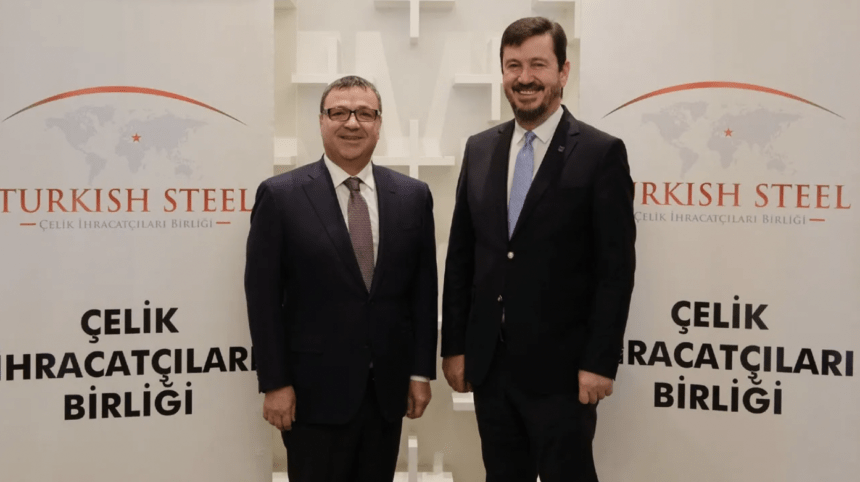The effects of the contraction in the steel industry due to oversupply caused by low demand and protectionist measures are deepening. Turkey’s foreign trade balance in the sector has turned into a deficit in finished steel products for the first time following steel.
The blood loss in the steel industry, which started in 2022, continues this year as well. In the 11 months of the year, the steel industry’s exports fell 31.2 percent to USD 14.3 billion. In terms of quantity, exports declined by 28.8 percent to 13 million tons, while Turkey’s steel imports increased by 14.8 percent to more than 17 million tons. Thus, Turkey became a net importer of finished steel products for the first time.
The steel industry is preparing to close this year with a contraction due to the protectionist measures implemented in export markets, especially the EU and the USA, and the continuing lack of demand in global markets. While the sector’s exports were USD 12.3 billion in the January-October period, its imports were measured as USD 16.2 billion in this period. Thus, Turkey became a net importer of finished steel products for the first time.
Steel Exporters’ Association (ÇİB) President Adnan Aslan and Vice President Uğur Dalbeler organized an evaluation meeting regarding 2023. In a statement made here, Aslan said that in the January-November period, exports decreased by 31.2 percent from USD 19 billion 697 million to USD 13 billion 545 million, while exports in terms of quantity decreased by 28.8 percent from 18 million 341 thousand tons to 13 million 55 thousand tons in the same period. Pointing out that imports increased by 14.8 percent in 10 months of the year compared to the same period of 2022, from 15 million 366 thousand tons to 17 million 639 thousand tons, Aslan said, “Turkey is now a net importer of steel products. Since 2015, we are leaving behind such a year for the first time. We have always been a net exporter of finished products.”
Turkey is like an ‘open market’
Pointing out that the increase in imports has come to a point where it will harm Turkey’s steel producers, Aslan emphasized that governments all over the world are implementing policies to protect the steel industry, while Turkey is still in an ‘open market’ position. Aslan said, “The protectionist measures of countries, quotas imposed by the EU, US taxes and the fact that countries such as Egypt and Algeria from North Africa became net exporters caused our exports to decrease. Another factor in the decline in our exports was the decline in freight and container prices. In 2022, we had gained a serious advantage in the sector as container and freight prices rose significantly. The loss of this advantage was also reflected in exports.”
Capacity utilization rate halved
Aslan continued his words as follows: “In 10 months of 2022, our production was 30 million 91 thousand tons. In 2023, it decreased by 8.8 percent to 27 million 454 thousand tons. Turkey exports 50-55 percent of its production. In 2022, our exports reached over 20 million tons. In the whole of 2023, it will approach 14 million tons. Under normal conditions, our 2023 target was 16 million tons and 16 billion dollars in exports. However, we fell behind,” he said. Underlining that capacity utilization rates in the steel sector have also dropped to 50-55 percent, Aslan cited the lack of demand and high energy costs as the most important reasons behind this decline.
Aslan referred to the dangerous increase in steel imports at a time when capacities have fallen so much. Aslan said, “Steel is imported both from countries with which we have signed FTAs and from other countries. However, products coming from imported countries disrupt the balances in the domestic market. At this point, we have also made applications to official institutions. As a result of the examinations to be made, if it is revealed that a subsidy is applied in these imports, we demanded that additional taxes be applied to the imports in question.”
WTO decision non-binding
The World Trade Organization (WTO) decided the previous day that Turkey should lift the tariffs imposed in retaliation for the US steel and aluminum tariffs, finding them ‘inconsistent’ with WTO policies. Commenting on the decision after the meeting, Uğur Dalbeler, Vice President of ÇİB, stated that the decisions taken by the WTO is non-binding “but it gives the winner the right to take a measure against the loser.” Since national decisions are outside the scope of the WTO, WTO could not intervene, Dalbeler said. The trade institution become dysfunctional since the judges in the appellate body are not appointed.











